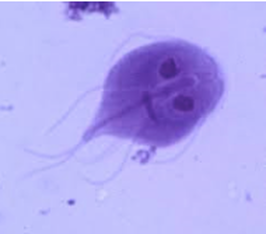Giardia is a protozoa parasite that can affect both pets and humans resulting in diarrhea. It is passed on by fecal oral transmission. This can occur indirectly by drinking from contaminated lakes, streams, puddles, and shallow wells or directly from the ingestion of contaminated feces.
Symptoms of giardia include acute or chronic diarrhea and rarely more severe signs such as vomiting, dehydration or weight loss. Some pets may carry giardia and be asymptomatic.
Diagnosis is made by testing the stool of affected pets. Occasionally giardia can be found by evaluating a stool sample under the microscope. But more reliably, giardia can be diagnosed with a SNAP test that detects giardia antigen in the stool, even at small levels.
Treatment of giardia can depend on the severity of symptoms. Typical treatment is with metronidazole (an antibacterial, antidiarrheal medication) which is given for 5-10 days and/or fenbendazole (aka Panacur -a dewormer) which is given once daily for 3-5 days. Bland diets that are easily digested are often prescribed to expedite return to normal stools. If a pet has other symptoms such as dehydration, nausea, blood in the stool or other concerning symptoms other diagnostics or therapies may be warranted.
Environmental control is an important step in helping prevent reinfection or transmission of infection to other pets/humans. Giardia can persist for months in cold water or damp, cool environments. Chemical disinfectants such as bleach (diluted 1:32 with water) can be helpful in cleaning up kennels and areas that can be safely cleaned with bleach. Swimming pools are not often contaminated if they are properly chlorinated, as chlorine also destroys giardia. Picking up fecal material and allowing a yard to dry out in the sun is also an effective way of controlling giardia in the environment.

